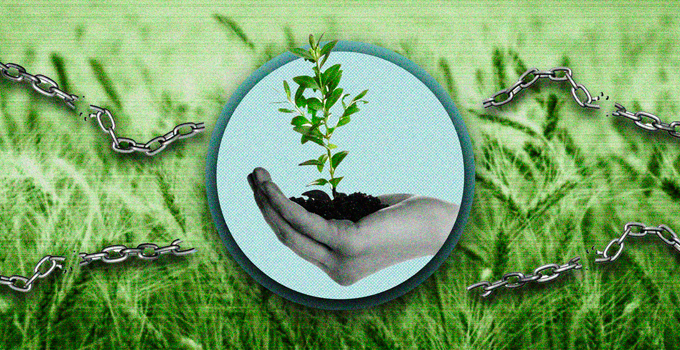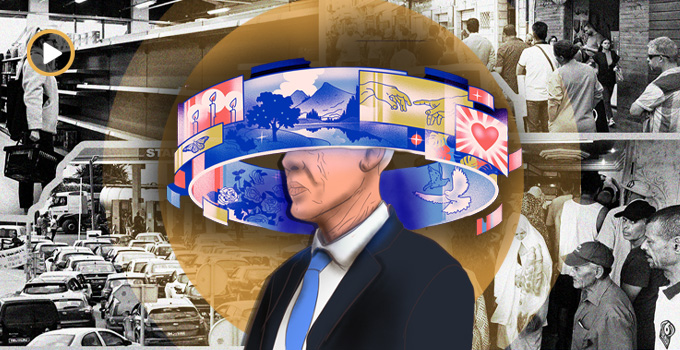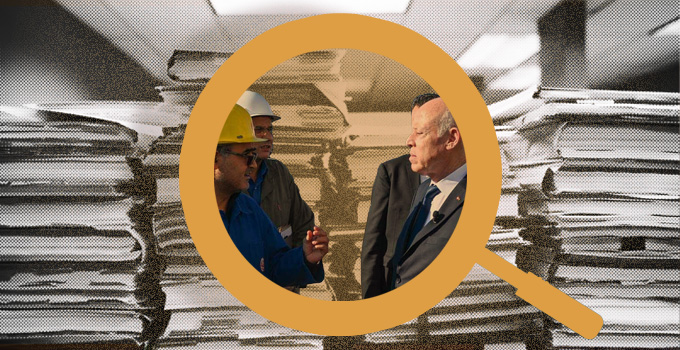Can the January 2018 protests by marginalized and angry youth be interpreted as the ultimate warning of a deep rejection of the elected political establishment in particular and the political and business elites in general? Do you think that we will witness a revolutionary escalation like in 2011?
These were the questions that Nawaat addressed to five foreign researchers who have written extensively about Tunisia’s politics and are familiar with the country’s particularities and complexities. It is a humble attempt by Nawaat to provide our readers with an outsider look that goes beyond Tunisia’s mainstream narrative, the polarized discourse and recurrent repression that accompanies every social movement.

Safwan M. Masri, author of Tunisia An Arab Anomaly (Columbia University Press, 2017)
I believe that the protests underscore the profound dissatisfaction with how the economic woes of ordinary Tunisians are being addressed. Neither the government nor the IMF have adequately considered the impact of the austerity measures or the economic disparity between the coastal and interior regions of the country. The IMF failed to do that in the 1980s, and it continues to do so now. Austerity measures are also an insufficient remedy to the deep structural problems in the economy that need to be fixed. Growth needs to be stimulated as well. But this requires a longer term, comprehensive set of measures that take into account citizens’ everyday economic realities and regional disparities. This must also include effective means to curb corruption. Legal and judicial steps need to be put into place in order to establish credibility on that front.
The protests serve as a reminder that government must move more quickly in delivering on the promises made since the revolution, including the implementation of the constitution, decentralizing power (through municipal elections, for starters), the institutionalization of democracy, and proper economic reform. I do not think that we will witness a revolutionary escalation similar to 2011. Much has been gained on the social dimension, and I do not think that Tunisians will want to risk regression. I do not interpret events as an outright, deep rejection of the elected political establishment, but as a warning to heed the demands of the population and to deliver much better performance. Failure to do so could signal rejection of the current establishment. If that is the case, let us hope that this does not mean a return to authoritarianism.
Finally, let us remember that economic problems are an age-old issue. They have persisted for decades, but have never been adequately addressed. To do so properly requires a far more nuanced and comprehensive approach. My major concern is that international organizations like the IMF are not as committed as they need to be. I am hopeful, though, that with the engagement of civil society, which has become far more vibrant since the revolution, compromises will be made and a patient, yet sensitive, approach to economic reform can take place.
Fadil Aliriza, journalist and researcher with a focus on politics of the US & MENA region, especially Tunisia
The protests can certainly be interpreted not merely as the rejection of a political establishment or the elites but as the latest manifestation of a popular rejection of a particular political and economic regime that has been shaping the Tunisian state for nearly four decades. We can use “neoliberal regime” as shorthand for the ways governance has expressed itself over this period with a trajectory of privatizing profits, wealth, and institutions while socializing losses and austerity, a program of deregulating controls on capital flows and investment while sharpening regulations and policing for labor and small businesses. When people go into the streets after years of asking for jobs, development, prices of basic goods affordable for their social class, public services – this is the expression of a vastly different vision of the state’s role in society, one fundamentally in contrast to the neoliberal regime upheld by multiple governments and promoted and supported by International Financial Institutions and key officials in the United States, European countries and the European Union.
Whether the current unrest will escalate is difficult to tell, but if it does it won’t be in the same was as in 2011. The most interesting aspect to the unrest for me is how there are multiple factors at work trying to keep the unrest directionless and divided. One of these is that authorities have been detaining the nascent leadership of educated youth in the cities, particularly the Fech Nastannew movement, many of them it appears arrested for grassroots organizing including handing out fliers. The harassment and criticism of foreign media by authorities also relate to this. A second factor is the media campaign that has been launched against the protests, with both the PM’s spokesperson and the Interior Ministry spokesperson dismissing the protests entirely as vandalism and looting and a national media that has at times nakedly worked to delegitimize and tar the protests and protest leaders. That has kept protest leaders on the defense, mostly limiting themselves to only calling for the repeal of the 2018 budget and not advocating a more revolutionary approach. A third factor is that Facebook is not operating in the same way as it did in 2011 to amplify news events: you can be in Tunis following Facebook and not really know what’s going on in the country.
Marc Lynch, author of “The New Arab Wars: Uprisings and Anarchy in the Middle East” (PublicAffairs) and “The Arab Uprisings Explained: New Contentious Politics in the Middle East” (Columbia University Press)
The eruption of protests in Tunisia should not have come as a surprise. For years, there have been clear warning signs of disenchantment with political stagnation, economic hardship, and the failed promises of democratic change. It will be difficult for these protests to escalate into another revolution as in 2011. The international and regional environments are very different. Here in Washington there is very little interest in supporting democratic change in the Middle East. In Tunisia, like in the rest of the Arab world, political polarization will likely get in the way of a broad popular opposition front. But the protests should send a strong message to the political elites that the status quo is unsustainable and that the government must respond to popular demands for justice, democratic freedoms, and economic policies which address the needs of the broader population.
Anne Wolf, author of “Political Islam in Tunisia: The History of Ennahda”
The January 2018 protests show that the political establishment has failed to respond to the aspirations of the people. In economic terms the situation is even worse than before the 2010-11 uprisings. Economic reforms are needed. However, the government needs to counter corruption, including high level corruption, and collect tax revenues before lifting the subsidies of goods of basic necessity, which touches the poorest. Most MPs haven’t yet declared their own assets; the powerful employer’s association, UTICA, is quite successful in protecting the interests of influential businessmen. In this context many perceive the austerity programme as a mockery of the people and the revolutionary goals more general. There is a general perception that the interest of the people comes last.
I don’t believe Tunisians want another revolution. Indeed, many Tunisians have had enough of the ‘revolution’ they got, which did not improve their economic status but often made it even worse, though they gained political liberties.
What Tunisia is facing right now is a crisis of confidence between the political class and the people. Many of the revolutionary goals, such as economic and social justice, seem no longer on the table. As long as many Tunisians struggle to make ends meet social unrest will continue. Many Tunisians don’t have the money to cook a proper meal. In 2017 the price of meat increased by about 13 percent. The 2018 austerity programme will make the situation even worse.
The economic crisis also feeds into jihadi recruitment networks. I don’t believe that there will be another revolution, but Tunisia could still become a failed state.
Rob Prince, professor at the Josef Korbel School of International Studies (University of Denver)
The wave of angry street protests were ignited in opposition to a harsh new budget which pushes up the prices of necessities, forced on the country in exchange for major International Monetary Fund loans. It was a typical structural adjustment austerity program in exchange for the loans. Protests targeted the new state budget for 2018, a budget passed last month (December, 2017) that had garnered the support of the Tunisian trade union, the Union Générale Tunisiene de Travail (UGTT), caught in dilemma, trying to moderate awful deal but ending up with something hardly better. In an otherwise informative article, (Ayari op-ed in the NY Times, 1/14/2018), a commentator suggested that the problem with the Tunisian budget is less the structural adjustment reforms in and of themselves, but the fact that the government failed to sugar-coat or sell them carefully enough to the public. To put it politely, I beg to differ.
This is a typical IMF structural adjustment program – and as in the past, repeatedly – it was greeted by the fine people of Tunisia with nationwide protests, these going back to the 1984 so-called “bread riots.” Then, in exchange for an earlier IMF structural adjustment program, the Tunisian government of the time tried to raise the price of basic commodities, among them the flour that goes into making bread. In those riots – which were happening all over the Third World at the time in response to similar IMF loan programs – 200 demonstrators were killed. Then president Habib Bourguiba had the good sense to pull out of the agreement at the time.
Two years later when Bourguiba was unceremoniously removed, one of the first acts of his successor, Zine Ben Ali, was to reopen negotiations with the IMF. Although there have been some suggestions that the IMF might have learned to alter loan conditions from nearly forty years of structural adjustment austerity program failures, there is no indication – none whatsoever – that the current loan to Tunisia is any different than hundreds of punitive loans made to MENA countries in the past, nor that it has in any way eased the socio-economic crisis long facing the country.
Having been through this kind of crisis in the past, the current Tunisian government appeared all too ready to make minor concessions in the hopes of cooling national anger. Might work, temporarily at least. In short order, a bit too quickly actually, the government announced a series of reforms that include free medical aid for unemployed youth, increased state pensions, increased financial assistance to poor families and the establishment of a housing. As a CNN report noted though, «While the reforms address concerns of the poor, they do not effectively change the 2018 budget legislation which many had protested against».
In 2016, the IMF authorized a $2.9 billion loan to Tunisia to be distributed over a four year period with the stated goal “to strengthen job creation and economic growth,” “ to support the authorities’ economic agenda aimed at promoting more inclusive growth and job creation, while protecting the most vulnerable households,”- as the IMF article on the loan states. To date, the loans have accomplished – nor even begun to accomplish – none of the above.
Beyond the limits of the current austerity program – unlikely to have any more positive results than the past ones – there is another nagging problem which has characterized the political situation since Ben Ali and Trabelsi fled the country: the lack of an economic vision for the future – either in the medium or long-term. Such a vision wasn’t provided by the Ennahdha Party, despite its still sizeable popular base, far more concerned as it was with strengthening the religious dimension of Tunisian life than addressing the socio-economic crisis for which it had – and continues to have – no ideas. Nor has it been provided by the factionalized Nida Tounes with its recycled members of the Ben Ali business community and government bureaucrats.
Without such vision and programs, “more of the same” can be expected – IMF loans to keep the country from total collapse perhaps but that in the end go nowhere, beyond helping the country limp along as it has these past seven years. As a result, no fundamental changes of the economic model, more polarization, uprisings like the current one are likely to continue, until “something” gives one way or another. All this in a country that has the human talent – intellectual, technical and financial, to guide the country out of the morass in which it finds itself. But those in power, domestically and abroad, have turned a blind eye to the country’s ample natural talent.





iThere are no comments
Add yours